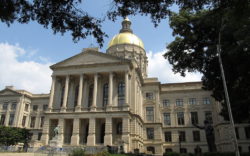In our system of government where citizens elect those who will make the decisions for them, voter registration and the casting of ballots are the fundamental elements of democracy. For more than a decade, there has been a battle between Georgia’s political parties over how that fundamental right should be regulated.
Republicans have made the path to the ballot box more difficult by passing laws that require voters to show photo ID cards. They say these restrictions are necessary to prevent election fraud. Democrats contend that the roadblocks are intended to discourage blacks, Latinos and other minorities from exercising their right to cast a ballot.
This partisan fight boiled over last week, just eight weeks prior to the general election. First Lady Michelle Obama made a campaign visit to Atlanta and urged Democrats to work harder at registering voters who might be the difference in close races this fall for governor and the U.S. Senate.
“These races are going to be unbelievably tight,” Obama said. “But here’s the good news: We have all the votes we need right now to win these races, if we get folks registered and if we got them out to vote in November.”
Three counties with significant percentages of black residents disclosed they will hold an early day of voting on a Sunday: Fulton, DeKalb and Lowndes. The intent is that persons would be able to attend church that Sunday and then cast an early ballot—“souls to the polls.”
Republicans pushed back against these attempts to register and vote more people. State Sen. Fran Millar (R-Dunwoody) denounced the plan for Sunday voting as a “blatantly partisan move” and vowed to introduce legislation to terminate the practice. Gov. Nathan Deal said he didn’t like the idea of Sunday voting either: “I don’t think anything that has to do with elections should be tilted one way or the other for partisan purposes.”
Secretary of State Brian Kemp, a Republican and the state’s chief elections officer, accused a voter registration group, the New Georgia Project, of committing voter fraud and launched a widely publicized investigation. “We’re just not going to put up with fraud,” Kemp said. “We have zero tolerance for that in Georgia. This is not about politics, this is about potential fraud.”
House Minority Leader Stacey Abrams (D-Atlanta) founded the New Georgia Project last year to increase voter registration among minority groups. She acknowledged some of the voter registration forms collected by the organization had mistakes, but said those were handed over to the state elections office along with the properly administered applications in an effort to be transparent about the group’s activities.
“We’ve worked very cooperatively with the Secretary of State’s office,” Abrams said. “They reviewed our training manual, they’ve talked to our staff. That’s one of the reasons I was so shocked to get the [Kemp] subpoena.”
The belief among Republicans is that they can more easily win Georgia’s races for governor and senator if they can minimize efforts to register and turn out minority voters. This strategy has been tried in other states where there are GOP-controlled legislatures, but there’s a problem: It hasn’t worked very well.
In 2012, several states enacted restrictive voting laws in an effort to hold down black turnout and help Mitt Romney in the presidential election. Black voters turned out anyway in the swing states, and President Barack Obama was re-elected. Kemp may be provoking a similar blowback among Georgia’s black citizens if he continues his attacks on voter registration groups.
“The idea of voter suppression echoes in a very painful way in the African American community,” said the Rev. Rafael Warnock, pastor of Atlanta’s Ebenezer Baptist Church. “People take great unction to the notion that their right to the ballot would be taken away.”
Like what you just read? Support Flagpole by making a donation today. Every dollar you give helps fund our ongoing mission to provide Athens with quality, independent journalism.










